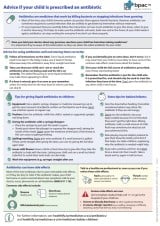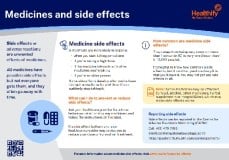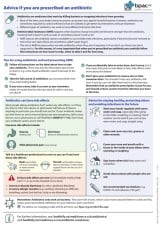You can now add Healthify as a preferred source on Google. Click here to see us when you search Google.
Flucloxacillin
Sounds like 'floo-klox-ah-sil-in'
Key points about flucloxacillin
- Flucloxacillin is an antibiotic used to treat infections caused by bacteria.
- It is a penicillin antibiotic.
- Find out how to take it safely and possible side effects.

Flucloxacillin is an antibiotic used to treat infections caused by bacteria, for example skin infections such as cellulitis. Flucloxacillin works by killing or stopping the growth of bacteria (bugs).
Flucloxacillin belongs to a group of antibiotics called penicillins. Like all antibiotics, flucloxacillin is not effective against infections caused by viruses.
For information on how to give flucloxacillin to children, see flucloxacillin information for parents and carers.(external link)
Allergy to penicillin
- Before taking flucloxacillin: Tell your healthcare provider if you have had an allergic reaction to a medicine, especially a penicillin antibiotic. True penicillin allergy is rare – fewer than 5 out of 10,000 people are allergic to penicillin. Most people who think they have a penicillin allergy do not – read more about penicillins and penicillin allergy).
- After taking flucloxacillin: If you develop signs of an allergic reaction such as skin rash, itching, swelling of your lips, face and mouth, or difficulty breathing, stop taking flucloxacillin and seek immediate medical attention.
In Aotearoa New Zealand flucloxacillin is available as capsules (250 mg and 500 mg) and liquid, and can be given as an injection in the hospital.
- Always take your flucloxacillin exactly as your doctor has told you. The pharmacy label on your medicine will tell you how much to take, how often to take it, and any special instructions.
- The dose of flucloxacillin will be different for different people depending on the type of infection.
- The usual dose of flucloxacillin capsules for adults is 500 mg, 4 times a day. Some people may need a higher dose.
- Your doctor will advise you on how long to take flucloxacillin for (usually 5 to 7 days).
- Swallow the capsule with a glass of water: Don't chew them. Flucloxacillin is best taken on an empty stomach, 1 hour before or 2 hours after food. If you have nausea (feeling sick), try taking it with food.
- Timing: Take flucloxacillin at the same times each day. Try to space your doses evenly throughout the day. For example, for 4 times a day dosing take it first thing in the morning, at around midday, late in the afternoon and at bedtime.
- Missed dose: If you forget to take your dose, take it as soon as you remember. But if it is nearly time for your next dose, take the next dose at the right time. Don't take extra doses to make up for a forgotten dose. If you're not sure what to do, ask your healthcare provider.
- Alcohol: You can drink alcohol while taking flucloxacillin but it can increase your risk of side effects such as nausea and vomiting. Avoid heavy drinking or binge drinking.
- Complete the course: Take the whole course of antibiotics for the number of days your doctor has told you to. Don't stop taking it, even if you feel your infection has cleared up. If you stop your treatment early, your infection could come back. If you still feel unwell after finishing the course, go back to see your doctor.
Like all medicines, flucloxacillin can cause side effects, although not everyone gets them. If you're concerned about any symptoms you think might be related to your medicine, talk to your healthcare provider. The following information offers some guidance but doesn't include all possible side effects.
Common side effects
Tell your healthcare provider if these side effects bother you.
- Nausea (feeling sick) or vomiting (being sick): Try taking your medicine with food. If you're sick (vomit) less than 30 minutes after having a dose of flucloxacillin, take the same dose again. But, if you're sick and it's more than 30 minutes after having a dose of flucloxacillin, you don't need to take another dose. Wait until the next normal dose. If you're also taking the oral contraceptive pill, let your healthcare provider or pharmacist know.
- Diarrhoea (runny poo): Drink plenty of fluids such as water to avoid dehydration. If you have diarrhoea and you’re also taking the oral contraceptive pill, let your healthcare provider or pharmacist know.
Tell your healthcare provider if these occur
- Signs of thrush in your mouth such as small white patches, pain or redness inside your mouth and cracks at the corners of your mouth.
- Signs of vaginal thrush such as itching, redness, soreness or unusual vaginal discharge (secretions) – this can be thick and white or thin and watery, without any smell.
Tell your healthcare provider immediately or phone Healthline free on 0800 611 116 if these occur
- Signs of problems with your liver such as yellowing of the eyes or skin, stomach pain, dark urine.
- Diarrhoea that is ongoing, gets worse or starts after you've completed your course of antibiotics or if you have diarrhoea with other symptoms such as abdominal pain, cramping and nausea (feeling sick).
Phone 111 for an ambulance or go to your nearest accident and emergency (A&E) clinic if these occur
- Signs of an allergic reaction such as itchy skin, and rash, swollen lips or tongue, problems breathing, like a tight chest or shortness of breath.
Read more about medicines and side effects and reporting a reaction you think might be a side effect.
The following links have more information on flucloxacillin:
- For adults: Flucloxacillin(external link) (te reo Māori(external link)) NZ Formulary, NZ
- For children: Flucloxacillin(external link) New Zealand Formulary for Children
Staphlex(external link) Medsafe Consumer Information, NZ
Flucloxacillin (AFT)(external link) Medsafe Consumer Information, NZ
Brochures
Advice if you are prescribed an antibiotic [PDF, 107 KB] BPAC, NZ, 2024
Advice if your child is prescribed an antibiotic [PDF, 98 KB] BPAC, NZ, 2024
Medicines and side effects [PDF, 91 KB] Healthify He Puna Waiora, NZ, 2024
Tools
Flucloxacillin paediatric dose calculator
References
- Flucloxacillin(external link) NZ Formulary, NZ
- Antibiotics – choices for common infections(external link) BPAC, NZ, 2021
- Gardiner SJ, Drennan PG, Begg R, et al. In healthy volunteers, taking flucloxacillin with food does not compromise effective plasma concentrations in most circumstances(external link) PLoS ONE 2018;13(7):e0199370
Brochures

Advice if your child is prescribed an antibiotic
BPAC, NZ, 2024

Medicines and side effects
Healthify He Puna Waiora, NZ, 2024
Credits: Sandra Ponen, Pharmacist, Healthify He Puna Waiora. Healthify is brought to you by Health Navigator Charitable Trust.
Reviewed by: Angela Lambie, Pharmacist, Auckland
Last reviewed:
Page last updated:






